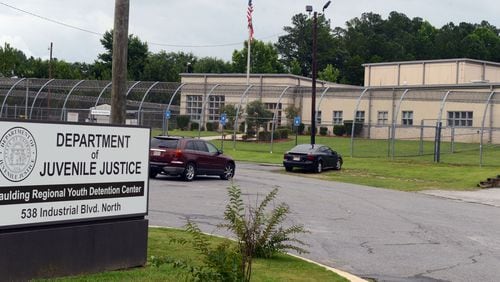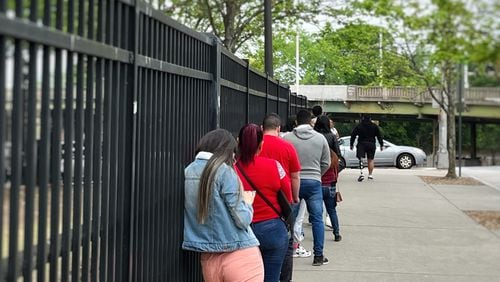How we got the story
The Atlanta Journal-Constitution discovered during research of records that some of the state’s juvenile detention centers are managed and operated by the private sector. Further research turned up records in other states of lawsuits brought against Youth Services International alleging physical and sexual abuse against juveniles held in the facilities the company manages. Some of the allegations involve claims of sexual contact between juveniles and staff.
The Georgia youth detention center with the country’s highest proportion of reported claims of sexual contact between juveniles and staff is managed by a private company with a troubled history in other states.
Youth Services International has had a state contract to staff and manage the Paulding Regional Youth Detention Center in Dallas west of Atlanta since 2008, and that agreement has been renewed every year since. YSI also operates two other Georgia youth detention facilities.
According to records, YSI has had trouble in every other state it has operated in, and some of those problems involve allegations of inappropriate sexual contact between juveniles and adult staff.
The state Department of Juvenile Justice did not respond to questions about its satisfaction with YSI or if the state knew of the company’s problems. Several attempts failed over the course of a week to reach YSI executives with the authority to speak for the Sarasota, Fla. company.
Last month, the U.S. Department of Justice released findings, from a 2012 anonymous survey required by the federal Prison Rape Elimination Act of 2003, that 32.1 percent of the juveniles at the Paulding center reported inappropriate sexual contact with staff as well as other teenagers. Paulding’s numbers were more than three times the national rate of 9.5 percent and were the nation’s highest. Three other state-run Georgia facilities were among the nation’s 13 worst performers in the survey, which were singled out for having at least 20 percent of juveniles reporting inappropriate sexual contact.
Until the report last month from the Department of Justice that recorded these reports by juveniles at the Paulding RYDC, none of the YSI- run juvenile institutions in Georgia had faced any public complaints.
But that is not the case in Florida, Minnesota, South Dakota or Iowa. In previous public statements about each instance YSI denied it had done anything wrong.
• Public defenders in Broward County, Fla., last summer asked a three-judge panel to scrutinize the operation at Thompson Academy in Pembroke Pines near Ft. Lauderdale, complaining that YSI had a “bottom-line” corporate culture that undermined rehabilitation. The public defenders said Thompson staff physically abused and intimidated juveniles and that they often used food as “currency” to reward certain behavior. The court said it was not its job to investigate and there were a number of other agencies that could provide oversight. Florida closed Thompson in January, saying the facility no longer fit in with the state’s juvenile justice system’s mission. YSI said in public statements there was no abuse, and the allegations were never pursued.
• The Southern Poverty Law Center brought a federal lawsuit in Florida in 2010 also claiming YSI staff at the Thompson Academy physically and sexually abused juveniles held there. The lawsuit said employees at Thompson routinely brutalized, choked and slammed the detainees into walls. The suit offered an example of a 15-year-old boy who reported a staff member had sexually assaulted him. It said the accused counselor was not removed and consequently assaulted the teenager a second time. The lawsuit was settled, the terms of the agreement were sealed, and each side in the suit — both private entities — were prohibited from discussing the resolution even though it involved the care of juveniles in the state’s custody.
In previous statements, YSI said it takes action against any staff who are found it have abused kids.
• An Iowa state investigation found “appalling” conditions at the YSI-run Forest Ridge Youth Services. A counselor later pleaded guilty to charges of sexual exploitation. Lawsuits filed in 2001 were merged and resolved but the settlement terms were not available.
• A federal lawsuit was brought in South Dakota where a juvenile held at the YSI-run Springfield Academy said he was sexually assaulted by a correctional officer in 2006 and YSI did nothing to protect him. In a federal lawsuit brought in South Dakota in 2000, there also were allegations of sexual and physical abuse of juveniles held at the Chamberlain Academy.
•In March 2012, two Minnesota counties stopped sending juveniles to YSI-run Elmore Academy because of concerns about staff turnover, low-paid employees’ qualifications and fears that truants and runaways were being housed with dangerous juveniles. As far back as 2000, Minnesota authorities were addressing allegations of sexual abuse of a teenager.
Specifics about the allegations by teenage boys in the federal anonymous surveys are not yet known. DJJ is conducting an investigation to learn the details.
Georgia pays YSI — which has contracts with Florida, Iowa, Minnesota and South Dakota — about $18 million a year to run three juvenile detention centers that collectively hold 264 boys and girls: the Paulding RYDC in Dallas, the Crisp RYDC in Cordele and the Milan YDC in Telfair County. The Justice Department did not survey juveniles at Milan. The Crisp survey reported 12.5 percent of juveniles reported sexual contact, which is closer to the 9.5 percent national average.
Sara Totonchi, executive director of the Southern Center for Human Rights Totonchi said, privately run centers’ need to make a profit for stockholders and company owners can be a problem. “The company running the prison is going to be cutting costs so that they can increase their take-home pay,” she said. “What we see is less (staff) training, less (staff) support and less accountability because those things are not necessarily consistent with higher profits.”
A DJJ spokesman said in an email it was not known why DJJ privatized three of its facilities. Often such a move is based on the belief that there will be savings for taxpayers if certain government functions are performed by the private sector.
Three DJJ facilities are privately run. State employees staff and manage six YDCs, which are prisons for juvenile offenders, and 18 RYDCs, which primarily hold juveniles waiting for final adjudication of their cases.







